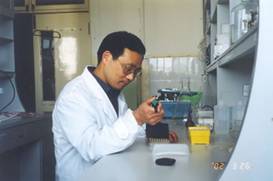|

Zheng Yongtang, researcher of the Kunming Institute of Zoology.
|
The Kunming Institute of Zoology under the Chinese Academy of Sciences has established the most complete anti-HIV medicine research and development (R&D) system in China, providing important technological support for the development of anti-HIV medicines with independent intellectual property rights, www.chinanews.com.cn reported on July 5.
Zheng Yongtang, the institute researcher who headed the research group, said the system incorporated the most complete laboratories in the country where anti-HIV medicine, vaccines, pathogenesis appraisals, and studies could be conducted from molecules of animal models of human diseases.
"Since 2004 when the project started, we have researched into the establishment of key technologies of anti-HIV medicine R&D and application, and also improved previous molecule and cell experiments," said Zheng. "We owe the success to the help given by Yunnan provincial government and the province's rich primate resources."
The completion of the system is important in the prevention and cure of AIDS in the province and the country, said Zheng. "Since the 1980s, when the HIV virus was discovered, the world still has yet to successfully develop an anti-HIV vaccine. Medicines remain the main means for the prevention and cure of AIDS."
China has no anti-HIV medicine with dependent intellectual property rights approved to be listed in the market, added Zheng. "Although some medicines have been proved to be quite effective in treatment, they are expensive and have somewhat harmful side effects."
Zheng revealed that his research group has conducted cooperation with more than 70 medical institutions in four countries, including Russia and India, in the field of anti-HIV medicine, vaccines and primates with AIDS-related disease.
"During the cooperation, we carefully screened out more than 4,000 kinds of anti-HIV activities from animals, plants, marine organisms and chemosynthesis," explained Zheng. "We have discovered a series of anti-HIV-1 agents purified from the plants like hops (Humulus lupulus) and the magnolia vine fruit (Schisandra)."
The institute had established nine key extra-corporeal screened-out technologies for anti-HIV medicines and extended the HIV virus medicine research database. "Meanwhile, we have separated and cultivated four diagnosed viruses prevailing in Yunnan Province. This has typically provided a basis for the research and development of anti-HIV medicines in China."
It is reported that the laboratories have become one of the most important bases serving the country in anti-HIV medicine screening-out and R&D.
Kunming Institute of Zoology
Established in April 1959, the Kunming Institute of Zoology is one of China's first-class zoological research institutes. It has access not only to the unique and diversified animal resources of the Eastern Himalayas, but also a wide variety of the species from across Southeast Asia.
The institute focuses on cutting-edge life science research, with experts in systematic zoology, conservation biology, cytology, molecular biology, genome evolution, reproductive and developmental biology, virus disease, zoological toxicology and primate biology.
(China.org.cn by Li Jingrong on July 7, 2009)